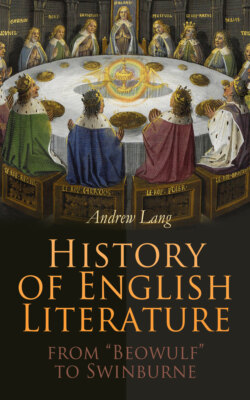Читать книгу History of English Literature from "Beowulf" to Swinburne - Andrew Lang, Robert Kirk - Страница 80
На сайте Литреса книга снята с продажи.
Blind Harry.
ОглавлениеBlind Harry, or "Henry the Minstrel," is a mysterious personage. Who was Harry? John Mair or Major (1469-1550) (?) is not an accurate historian; the Antiquary, in Scott's novel, calls him "a pillar of falsehood". Major says that, in his own infancy (say 1480) a man blind from his birth wrote "Schir William Wallace," and supported himself by chanting it to the nobles. The manuscript is of 1488. A few entries of small sums paid to "Blind Harry" occur in the Royal accounts, ending in 1492, and Harry was dead when (1508) Dunbar printed his Lament for poets dead and gone. Harry may have become blind, but can hardly have been blind from his birth. Though he calls himself "a borel man," an unlettered man, he had some education; he was not a ballad maker, but produced a romance of nearly 12,000 lines. He says that he had a Latin source, a narrative written by Wallace's chaplain, John Blair, of which nothing is known.
He is full of anachronisms, and tells long adventures of Wallace with Edward I and his Queen which never occurred. Tradition, already mythical, is his chief source, his Wallace is but little more historical than Grettir in the Icelandic Saga, and like him has dealings with a ghost, that of a slain man, which appears with its head in its hand. Wallace, whose wife, it is said, was slain by the English, is a very bloodthirsty hero; his manslayings and burnings of houses are many. Harry has not too high an opinion of Bruce. His hero, Wallace, has always been, thanks mainly to Harry, the most popular of Scottish heroes. Harry tells his tale with abundant energy; he hates the English infinitely more than the chivalrous Barbour did, and he is perfectly free from the influence of the "Roman de la Rose". His verse is not wholly correct; eight consecutive lines have the following rhymes,—"been, keen, saw, mean, seen, raw, knaw, teir, faw," indeed some passages have a kind of stanza formation, in the Second Book (lines 260-360).
We must not look on Harry as an unlearned maker of Border ballads. He had read Wyntoun, and Chaucer (though he does not make Chaucer his model), and he borrows from the alliterative romance of "Arthur" ascribed to the mysterious Huchown. Moreover, it has been proved, and anybody can see it, that he stole adventures of Robert Bruce from Barbour's poem, and made Wallace, not Bruce, their hero. Harry takes some of Bruce's battles and transfers them to Wallace. "Harry nearly uproots Barbour." Whereas Bruce, on the eve of Bannockburn, cut down Sir Henry Bohun, as he charged, with a blow of his axe, Harry declares that Wallace dealt this very stroke on Bruce's spear and horse's neck. To Wallace he attributes the famous campaign in which Bruce drove Edward II within the walls of York (1322).1
Harry is, in short, a mystery, and his book, wholly worthless as history, is a colossal perversion of Barbour "The Bruce," with other matter from pure fancy or from unknown legend, while great parts are played by men of Harry's own time, English in-evading knights of 1483.
